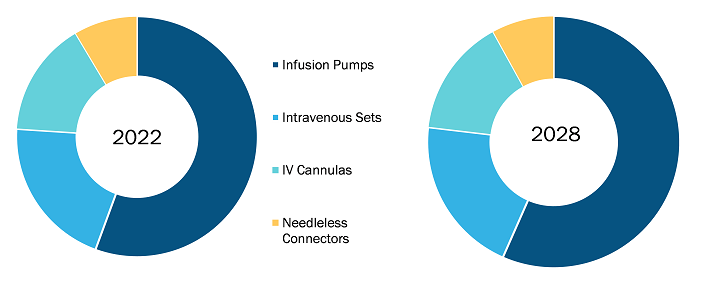The home infusion therapy market is expected to reach at US$ 35,696.05 million by 2028; the market is registering at a CAGR of 8.6% from 2022 to 2028, according to a new research study conducted by The Insight partners
Infusion Pumps Segment to Hold Major Market Share During 2022–2028
The report highlights the trends and drivers prevailing in the market.
Based on product, the home infusion therapy market is segmented into infusion pump, intravenous sets, IV cannulas, and needleless connectors. The market for the infusion pump segment is further segmented into insulin pumps, elastomeric pumps, syringe pumps, and others. The infusion pumps segment held the largest market share in 2021 and is anticipated to register the highest CAGR during 2022–2028. An infusion pump offers significant advantages over the manual administration of the fluids. These advantages include delivering fluids in small amounts and at programmed rates and automated intervals. Infusion pumps are frequently used to administer critical fluids, including high-risk medications. However, pump failures can lead to significant implications for patient safety. Hence, new infusion pumps, known as smart pumps, are being developed to avoid such failures. Many infusion pumps are equipped with safety features such as alarms or other operator alerts intended to activate in the event of an issue with the device. BD manufactures BD BodyGuard T that provides three-point syringe detection feature, each with a displacement alarm. A few different types of infusion pumps are ambulatory infusion pumps, insulin pumps, syringe pumps, elastomeric pumps, patient-controlled analgesics, and volumetric pumps.

Home Infusion Therapy Market Overview and Forecast by 2028
Download Free SampleHome Infusion Therapy Market Forecast to 2028 - Analysis By Product (Infusion Pumps, Intravenous Sets, IV Cannulas, and Needleless Connectors), Application (Anti-Infective, Endocrinology, Enteral Nutrition, Hydration Therapy, Chemotherapy, Specialty Pharmaceuticals, and Others), and Route of Administration (Intramuscular, Subcutaneously, and Epidural)
Based on route of administration, the home infusion therapy market is segmented into intramuscular, subcutaneously, and epidural. The intramuscular segment held the largest share of the market in 2021 and is expected to register the highest CAGR during the forecast period. The medications are given into the depth of specifically selected muscles through the intramuscular route. The bulky muscles have good vascularity; therefore, the injected drug quickly reaches the systemic circulation and then into the specific region of action, bypassing the first-pass metabolism. The most common type of medications given through this route are antibiotics, biologics, and hormones. When the drug is given in aqueous solution form, it is absorbed rapidly and is spread uniformly across the body. This increases the efficacy of the medication that is administered. As compared to the subcutaneous route, the intramuscular route provides rapid onset of the action of the medication and avoids gastric problems associated with drug absorption.
Impact of COVID-19 Pandemic on Home Infusion Therapy Market
The rising number of COVID-19 patients led to an overall positive impact on the home infusion therapy market. During COVID-19 pandemic, home infusion providers were encouraged to participate in NHIA’s COVID-19 Home Infusion Therapy Program (C-HIT) by offering home infusion of COVID-19 monoclonal antibodies. Furthermore, in 2021, the US Food and Drug Administration (US FDA) authorized an Emergency Use Authorization (EUA) of monoclonal antibody IV therapy for COVID-19 patients. Monoclonal antibody therapy is used for COVID-19 patients with mild to moderate symptoms. Intravenous (IV) therapy delivers medicines directly into patient’s bloodstream. Monoclonal antibodies block viral attachment and entry into human cells to neutralize the virus. Also, in November 2020, the FDA approved a EUA for casirivimab and imdevimab to be administered together for the treatment of mild to moderate COVID-19 in adults and pediatric patients. Additionally, IV vitamin drips were administered to COVID-19 patients for recovery. Thus, growing FDA approvals for home infusion therapy and IV drips for COVID-19 patients support the home infusion therapy market. The pandemic severely affected the older population and people suffering from pre-existing conditions were at major risk for severe illness and mortality from this virus. A significant proportion of this population needs long-term care, often provided in their own homes by carers, including family members or professional home care providers. Out of 83 million Germany's population, about 4.1 million people received benefits under the long-term care insurance act (Social Code Book XI/SGB XI) in 2019, of which 3.3 million lived in their own homes and around 800,000 in residential care facilities (Statistisches Bundesamt, 2020). These factors favored the growth of the home infusion therapy market during the peak of the pandemic.
B. Braun Melsungen AG, Micrel Medical Devices SA, Baxter International Inc, Nipro Corp, Becton Dickinson and Co, Fresenius Kabi AG, ICU Medical Inc, JMS Co Ltd, Eitan Medical Ltd, and Terumo Corp are among the several players engaged in addressing the growing demands for home infusion therapies.
The report segments the home infusion therapy market as follows:
The home infusion therapy market is segmented on the basis of product, application, route of administration, and geography. Based on product, the home infusion therapy market is segmented into infusion pump, intravenous sets, IV cannulas, and needleless connectors. The market for the infusion pumps segment is further segmented into insulin pumps, elastomeric pumps, syringe pumps, and others. Based on application, the home infusion therapy market is segmented into enteral nutrition, anti-infective, endocrinology, hydration therapy, chemotherapy, specialty pharmaceuticals, and others. Based on route of administration, the home infusion therapy market is segmented into intramuscular, subcutaneously, and epidural. Based on geography, the home infusion therapy market is segmented into North America (the US, Canada, and Mexico), Europe (the UK, Germany, France, Italy, the Netherlands, and the Rest of Europe), Asia Pacific (China, Japan, India, Australia, Thailand, and the Rest of Asia Pacific), the Middle East & Africa (the UAE, Saudi Arabia, South Africa, and the Rest of Middle East & Africa), and South & Central America (Brazil, Argentina, and the Rest of South & Central America).
Contact Us
Phone: +1-646-491-9876
Email Id: sales@theinsightpartners.com